Strategic Analysis: Aboriginal Cultural Tours' UK Market Entry Report
VerifiedAdded on 2023/01/19
|13
|4607
|62
Report
AI Summary
This report examines the potential for Aboriginal Cultural Tours, an Australian tourism company, to expand its business into the United Kingdom. The analysis employs a PESTLE framework to assess the political, economic, social, technological, environmental, and legal factors influencing the UK market. The report considers the UK's political stability, economic conditions, and social trends, including consumer preferences and the impact of Brexit and terrorism on the tourism sector. It also evaluates technological advancements, environmental concerns, and legal regulations affecting the hospitality industry. The findings highlight the opportunities and threats associated with the expansion, providing insights into how Aboriginal Cultural Tours can strategize its promotional and expansion plans to successfully enter the UK market, taking into account visa regulations, VAT, and Air Passenger Duty. Recommendations are provided to help the company navigate the complexities of the UK tourism landscape and capitalize on its cultural offerings.

Running head: GLOBAL ENTRY OF ABORIGINAL CULTURAL TOURS
GLOBAL ENTRY OF ABORIGINAL CULTURAL TOURS
Name of the Student
Name of the University
Author Note
GLOBAL ENTRY OF ABORIGINAL CULTURAL TOURS
Name of the Student
Name of the University
Author Note
Paraphrase This Document
Need a fresh take? Get an instant paraphrase of this document with our AI Paraphraser
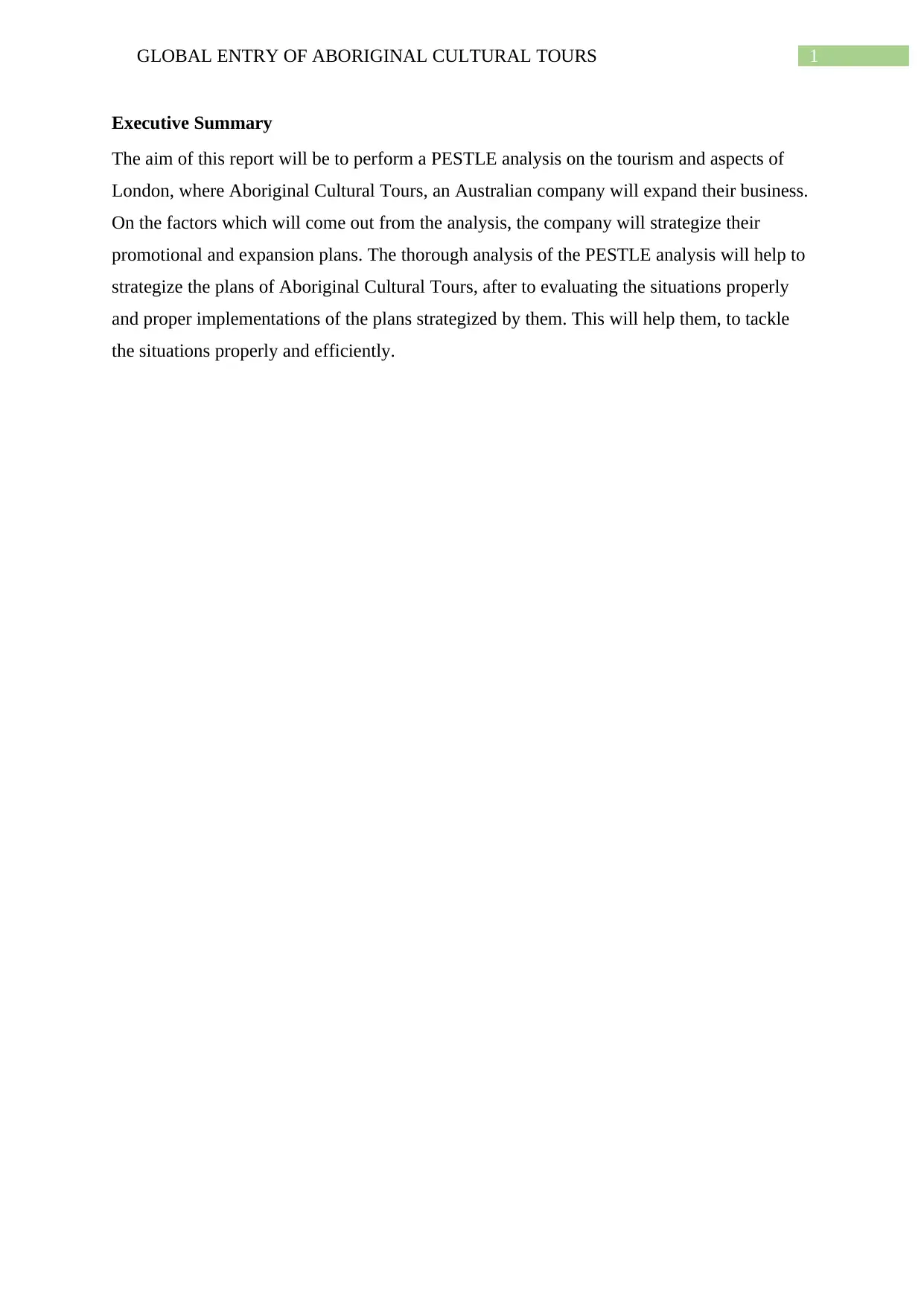
1GLOBAL ENTRY OF ABORIGINAL CULTURAL TOURS
Executive Summary
The aim of this report will be to perform a PESTLE analysis on the tourism and aspects of
London, where Aboriginal Cultural Tours, an Australian company will expand their business.
On the factors which will come out from the analysis, the company will strategize their
promotional and expansion plans. The thorough analysis of the PESTLE analysis will help to
strategize the plans of Aboriginal Cultural Tours, after to evaluating the situations properly
and proper implementations of the plans strategized by them. This will help them, to tackle
the situations properly and efficiently.
Executive Summary
The aim of this report will be to perform a PESTLE analysis on the tourism and aspects of
London, where Aboriginal Cultural Tours, an Australian company will expand their business.
On the factors which will come out from the analysis, the company will strategize their
promotional and expansion plans. The thorough analysis of the PESTLE analysis will help to
strategize the plans of Aboriginal Cultural Tours, after to evaluating the situations properly
and proper implementations of the plans strategized by them. This will help them, to tackle
the situations properly and efficiently.

2GLOBAL ENTRY OF ABORIGINAL CULTURAL TOURS
Table of Contents
Introduction................................................................................................................................3
Strategic Analysis of the Environmental Variables...................................................................3
Political Factor.......................................................................................................................4
Economic Factors...................................................................................................................5
Social Factors.........................................................................................................................5
Technological Factors............................................................................................................6
Environmental Factors...........................................................................................................7
Legal Factors..........................................................................................................................7
Recommendations......................................................................................................................8
Conclusion..................................................................................................................................8
Table of Contents
Introduction................................................................................................................................3
Strategic Analysis of the Environmental Variables...................................................................3
Political Factor.......................................................................................................................4
Economic Factors...................................................................................................................5
Social Factors.........................................................................................................................5
Technological Factors............................................................................................................6
Environmental Factors...........................................................................................................7
Legal Factors..........................................................................................................................7
Recommendations......................................................................................................................8
Conclusion..................................................................................................................................8
⊘ This is a preview!⊘
Do you want full access?
Subscribe today to unlock all pages.

Trusted by 1+ million students worldwide
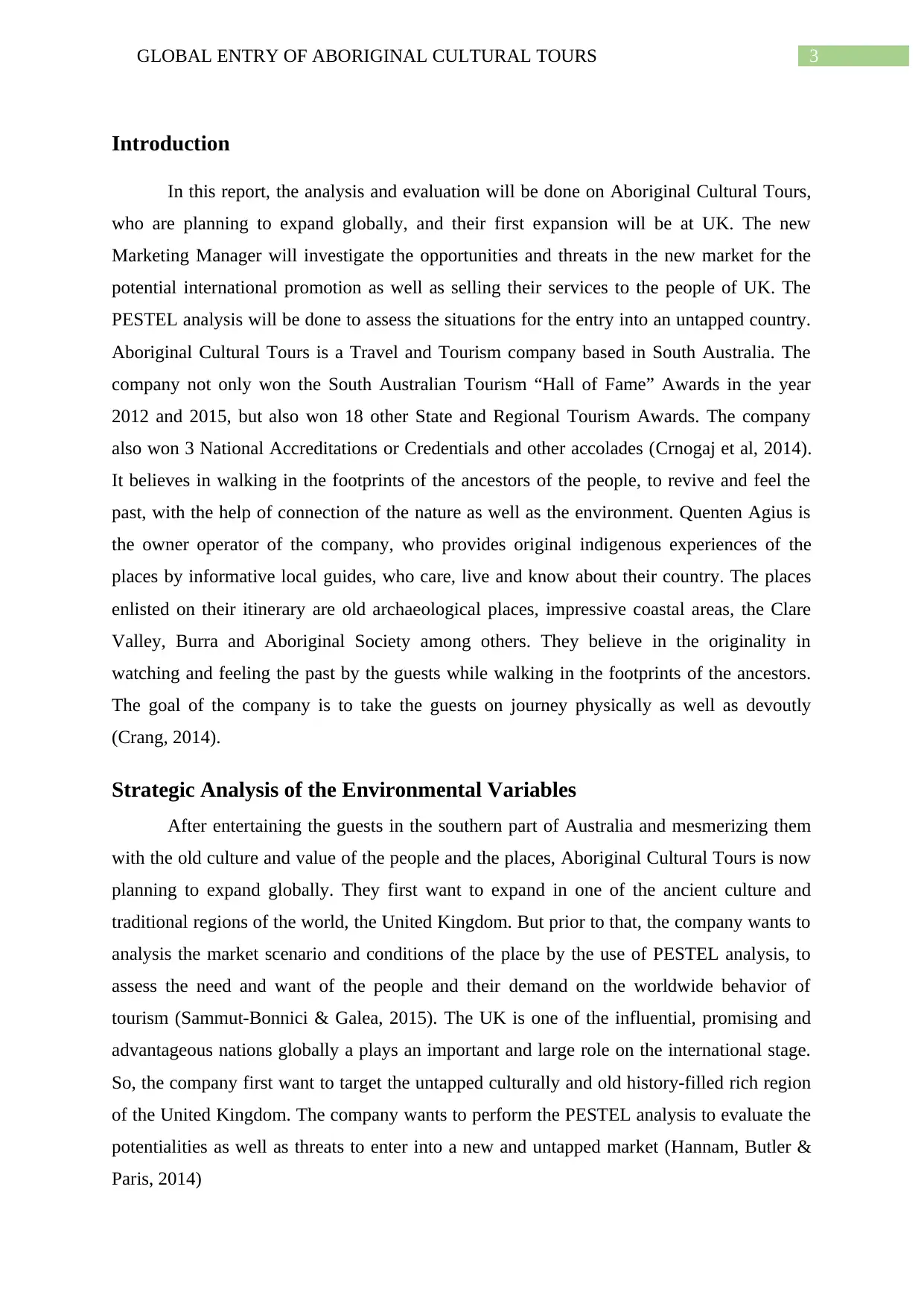
3GLOBAL ENTRY OF ABORIGINAL CULTURAL TOURS
Introduction
In this report, the analysis and evaluation will be done on Aboriginal Cultural Tours,
who are planning to expand globally, and their first expansion will be at UK. The new
Marketing Manager will investigate the opportunities and threats in the new market for the
potential international promotion as well as selling their services to the people of UK. The
PESTEL analysis will be done to assess the situations for the entry into an untapped country.
Aboriginal Cultural Tours is a Travel and Tourism company based in South Australia. The
company not only won the South Australian Tourism “Hall of Fame” Awards in the year
2012 and 2015, but also won 18 other State and Regional Tourism Awards. The company
also won 3 National Accreditations or Credentials and other accolades (Crnogaj et al, 2014).
It believes in walking in the footprints of the ancestors of the people, to revive and feel the
past, with the help of connection of the nature as well as the environment. Quenten Agius is
the owner operator of the company, who provides original indigenous experiences of the
places by informative local guides, who care, live and know about their country. The places
enlisted on their itinerary are old archaeological places, impressive coastal areas, the Clare
Valley, Burra and Aboriginal Society among others. They believe in the originality in
watching and feeling the past by the guests while walking in the footprints of the ancestors.
The goal of the company is to take the guests on journey physically as well as devoutly
(Crang, 2014).
Strategic Analysis of the Environmental Variables
After entertaining the guests in the southern part of Australia and mesmerizing them
with the old culture and value of the people and the places, Aboriginal Cultural Tours is now
planning to expand globally. They first want to expand in one of the ancient culture and
traditional regions of the world, the United Kingdom. But prior to that, the company wants to
analysis the market scenario and conditions of the place by the use of PESTEL analysis, to
assess the need and want of the people and their demand on the worldwide behavior of
tourism (Sammut‐Bonnici & Galea, 2015). The UK is one of the influential, promising and
advantageous nations globally a plays an important and large role on the international stage.
So, the company first want to target the untapped culturally and old history-filled rich region
of the United Kingdom. The company wants to perform the PESTEL analysis to evaluate the
potentialities as well as threats to enter into a new and untapped market (Hannam, Butler &
Paris, 2014)
Introduction
In this report, the analysis and evaluation will be done on Aboriginal Cultural Tours,
who are planning to expand globally, and their first expansion will be at UK. The new
Marketing Manager will investigate the opportunities and threats in the new market for the
potential international promotion as well as selling their services to the people of UK. The
PESTEL analysis will be done to assess the situations for the entry into an untapped country.
Aboriginal Cultural Tours is a Travel and Tourism company based in South Australia. The
company not only won the South Australian Tourism “Hall of Fame” Awards in the year
2012 and 2015, but also won 18 other State and Regional Tourism Awards. The company
also won 3 National Accreditations or Credentials and other accolades (Crnogaj et al, 2014).
It believes in walking in the footprints of the ancestors of the people, to revive and feel the
past, with the help of connection of the nature as well as the environment. Quenten Agius is
the owner operator of the company, who provides original indigenous experiences of the
places by informative local guides, who care, live and know about their country. The places
enlisted on their itinerary are old archaeological places, impressive coastal areas, the Clare
Valley, Burra and Aboriginal Society among others. They believe in the originality in
watching and feeling the past by the guests while walking in the footprints of the ancestors.
The goal of the company is to take the guests on journey physically as well as devoutly
(Crang, 2014).
Strategic Analysis of the Environmental Variables
After entertaining the guests in the southern part of Australia and mesmerizing them
with the old culture and value of the people and the places, Aboriginal Cultural Tours is now
planning to expand globally. They first want to expand in one of the ancient culture and
traditional regions of the world, the United Kingdom. But prior to that, the company wants to
analysis the market scenario and conditions of the place by the use of PESTEL analysis, to
assess the need and want of the people and their demand on the worldwide behavior of
tourism (Sammut‐Bonnici & Galea, 2015). The UK is one of the influential, promising and
advantageous nations globally a plays an important and large role on the international stage.
So, the company first want to target the untapped culturally and old history-filled rich region
of the United Kingdom. The company wants to perform the PESTEL analysis to evaluate the
potentialities as well as threats to enter into a new and untapped market (Hannam, Butler &
Paris, 2014)
Paraphrase This Document
Need a fresh take? Get an instant paraphrase of this document with our AI Paraphraser
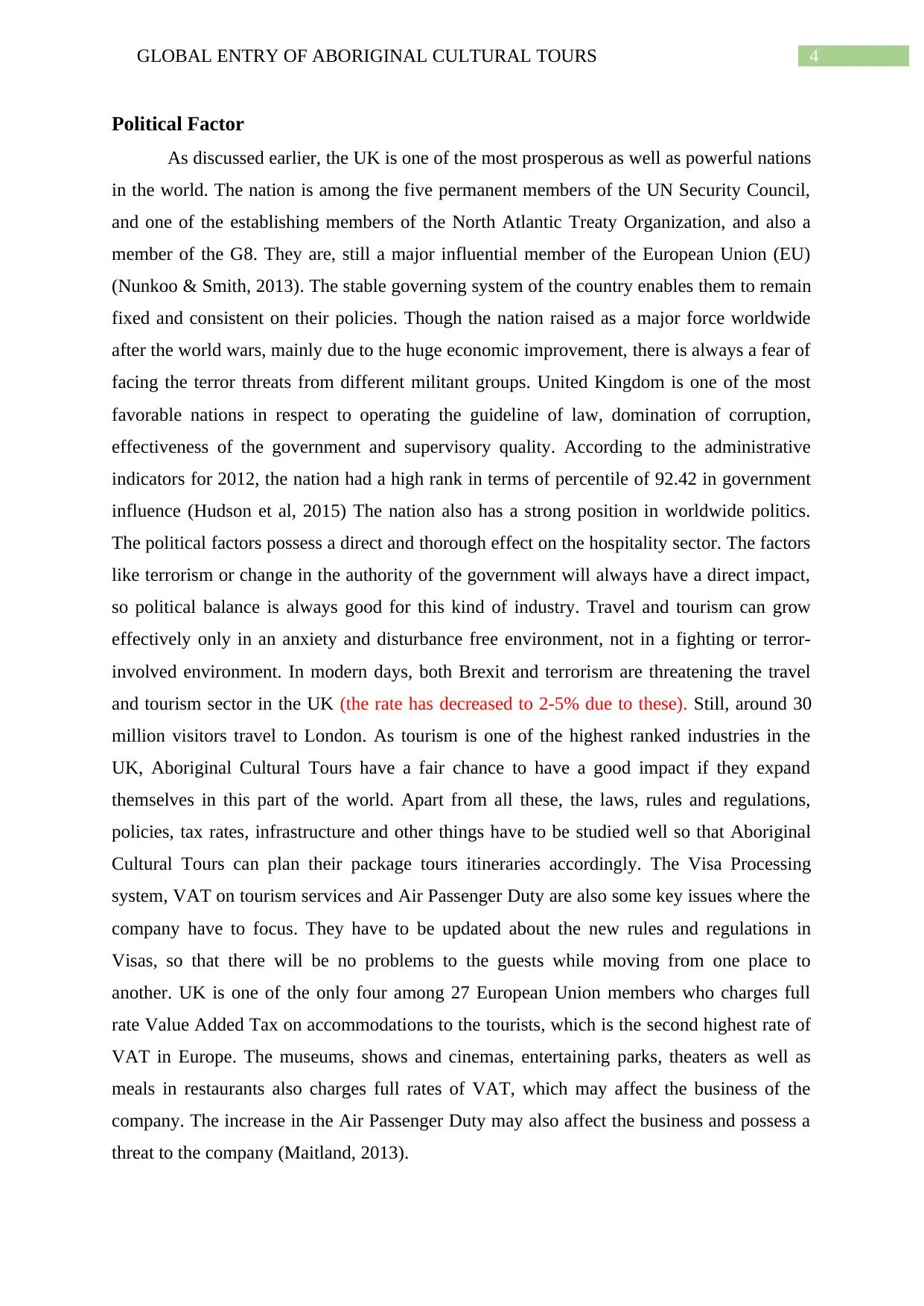
4GLOBAL ENTRY OF ABORIGINAL CULTURAL TOURS
Political Factor
As discussed earlier, the UK is one of the most prosperous as well as powerful nations
in the world. The nation is among the five permanent members of the UN Security Council,
and one of the establishing members of the North Atlantic Treaty Organization, and also a
member of the G8. They are, still a major influential member of the European Union (EU)
(Nunkoo & Smith, 2013). The stable governing system of the country enables them to remain
fixed and consistent on their policies. Though the nation raised as a major force worldwide
after the world wars, mainly due to the huge economic improvement, there is always a fear of
facing the terror threats from different militant groups. United Kingdom is one of the most
favorable nations in respect to operating the guideline of law, domination of corruption,
effectiveness of the government and supervisory quality. According to the administrative
indicators for 2012, the nation had a high rank in terms of percentile of 92.42 in government
influence (Hudson et al, 2015) The nation also has a strong position in worldwide politics.
The political factors possess a direct and thorough effect on the hospitality sector. The factors
like terrorism or change in the authority of the government will always have a direct impact,
so political balance is always good for this kind of industry. Travel and tourism can grow
effectively only in an anxiety and disturbance free environment, not in a fighting or terror-
involved environment. In modern days, both Brexit and terrorism are threatening the travel
and tourism sector in the UK (the rate has decreased to 2-5% due to these). Still, around 30
million visitors travel to London. As tourism is one of the highest ranked industries in the
UK, Aboriginal Cultural Tours have a fair chance to have a good impact if they expand
themselves in this part of the world. Apart from all these, the laws, rules and regulations,
policies, tax rates, infrastructure and other things have to be studied well so that Aboriginal
Cultural Tours can plan their package tours itineraries accordingly. The Visa Processing
system, VAT on tourism services and Air Passenger Duty are also some key issues where the
company have to focus. They have to be updated about the new rules and regulations in
Visas, so that there will be no problems to the guests while moving from one place to
another. UK is one of the only four among 27 European Union members who charges full
rate Value Added Tax on accommodations to the tourists, which is the second highest rate of
VAT in Europe. The museums, shows and cinemas, entertaining parks, theaters as well as
meals in restaurants also charges full rates of VAT, which may affect the business of the
company. The increase in the Air Passenger Duty may also affect the business and possess a
threat to the company (Maitland, 2013).
Political Factor
As discussed earlier, the UK is one of the most prosperous as well as powerful nations
in the world. The nation is among the five permanent members of the UN Security Council,
and one of the establishing members of the North Atlantic Treaty Organization, and also a
member of the G8. They are, still a major influential member of the European Union (EU)
(Nunkoo & Smith, 2013). The stable governing system of the country enables them to remain
fixed and consistent on their policies. Though the nation raised as a major force worldwide
after the world wars, mainly due to the huge economic improvement, there is always a fear of
facing the terror threats from different militant groups. United Kingdom is one of the most
favorable nations in respect to operating the guideline of law, domination of corruption,
effectiveness of the government and supervisory quality. According to the administrative
indicators for 2012, the nation had a high rank in terms of percentile of 92.42 in government
influence (Hudson et al, 2015) The nation also has a strong position in worldwide politics.
The political factors possess a direct and thorough effect on the hospitality sector. The factors
like terrorism or change in the authority of the government will always have a direct impact,
so political balance is always good for this kind of industry. Travel and tourism can grow
effectively only in an anxiety and disturbance free environment, not in a fighting or terror-
involved environment. In modern days, both Brexit and terrorism are threatening the travel
and tourism sector in the UK (the rate has decreased to 2-5% due to these). Still, around 30
million visitors travel to London. As tourism is one of the highest ranked industries in the
UK, Aboriginal Cultural Tours have a fair chance to have a good impact if they expand
themselves in this part of the world. Apart from all these, the laws, rules and regulations,
policies, tax rates, infrastructure and other things have to be studied well so that Aboriginal
Cultural Tours can plan their package tours itineraries accordingly. The Visa Processing
system, VAT on tourism services and Air Passenger Duty are also some key issues where the
company have to focus. They have to be updated about the new rules and regulations in
Visas, so that there will be no problems to the guests while moving from one place to
another. UK is one of the only four among 27 European Union members who charges full
rate Value Added Tax on accommodations to the tourists, which is the second highest rate of
VAT in Europe. The museums, shows and cinemas, entertaining parks, theaters as well as
meals in restaurants also charges full rates of VAT, which may affect the business of the
company. The increase in the Air Passenger Duty may also affect the business and possess a
threat to the company (Maitland, 2013).
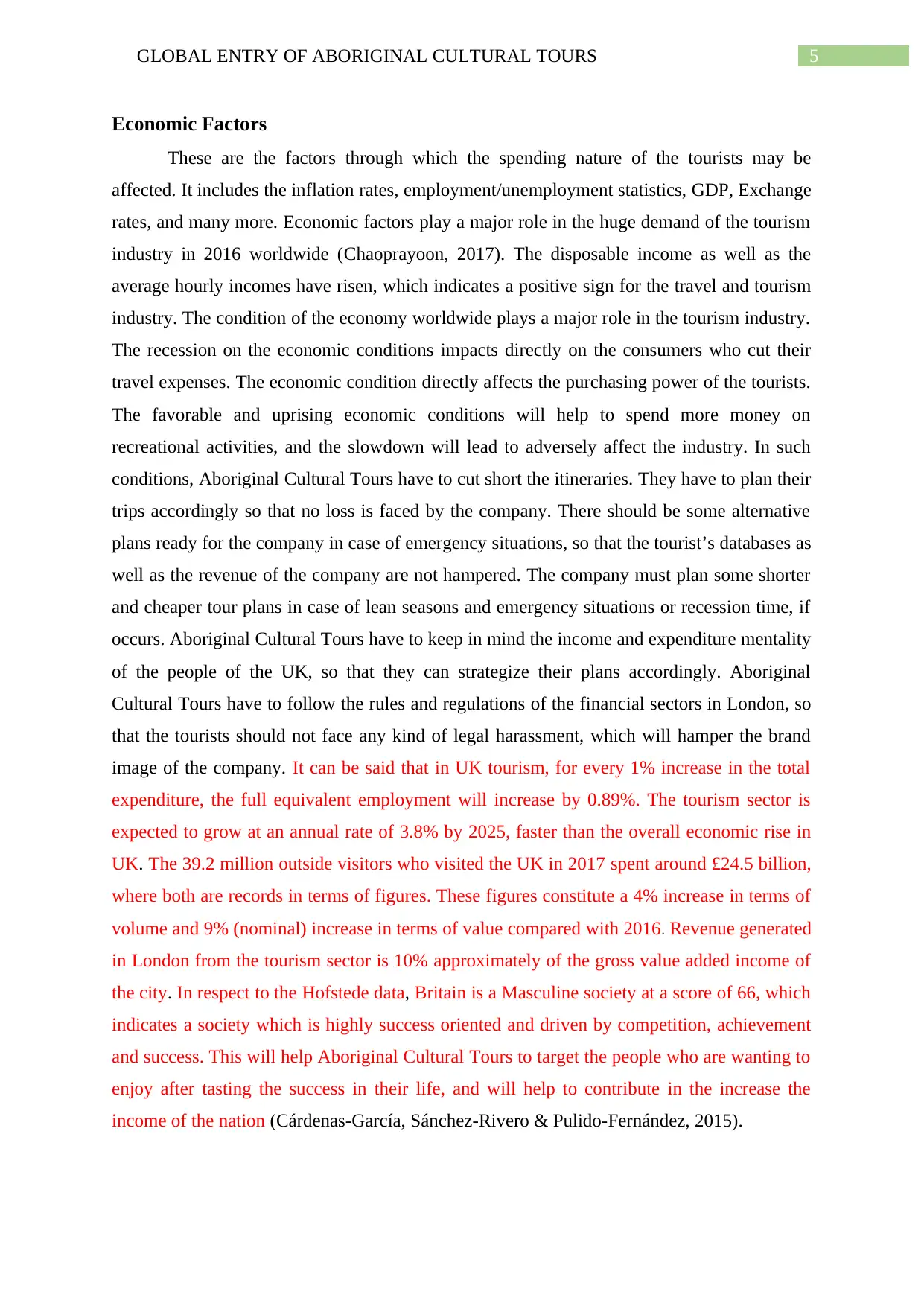
5GLOBAL ENTRY OF ABORIGINAL CULTURAL TOURS
Economic Factors
These are the factors through which the spending nature of the tourists may be
affected. It includes the inflation rates, employment/unemployment statistics, GDP, Exchange
rates, and many more. Economic factors play a major role in the huge demand of the tourism
industry in 2016 worldwide (Chaoprayoon, 2017). The disposable income as well as the
average hourly incomes have risen, which indicates a positive sign for the travel and tourism
industry. The condition of the economy worldwide plays a major role in the tourism industry.
The recession on the economic conditions impacts directly on the consumers who cut their
travel expenses. The economic condition directly affects the purchasing power of the tourists.
The favorable and uprising economic conditions will help to spend more money on
recreational activities, and the slowdown will lead to adversely affect the industry. In such
conditions, Aboriginal Cultural Tours have to cut short the itineraries. They have to plan their
trips accordingly so that no loss is faced by the company. There should be some alternative
plans ready for the company in case of emergency situations, so that the tourist’s databases as
well as the revenue of the company are not hampered. The company must plan some shorter
and cheaper tour plans in case of lean seasons and emergency situations or recession time, if
occurs. Aboriginal Cultural Tours have to keep in mind the income and expenditure mentality
of the people of the UK, so that they can strategize their plans accordingly. Aboriginal
Cultural Tours have to follow the rules and regulations of the financial sectors in London, so
that the tourists should not face any kind of legal harassment, which will hamper the brand
image of the company. It can be said that in UK tourism, for every 1% increase in the total
expenditure, the full equivalent employment will increase by 0.89%. The tourism sector is
expected to grow at an annual rate of 3.8% by 2025, faster than the overall economic rise in
UK. The 39.2 million outside visitors who visited the UK in 2017 spent around £24.5 billion,
where both are records in terms of figures. These figures constitute a 4% increase in terms of
volume and 9% (nominal) increase in terms of value compared with 2016. Revenue generated
in London from the tourism sector is 10% approximately of the gross value added income of
the city. In respect to the Hofstede data, Britain is a Masculine society at a score of 66, which
indicates a society which is highly success oriented and driven by competition, achievement
and success. This will help Aboriginal Cultural Tours to target the people who are wanting to
enjoy after tasting the success in their life, and will help to contribute in the increase the
income of the nation (Cárdenas-García, Sánchez-Rivero & Pulido-Fernández, 2015).
Economic Factors
These are the factors through which the spending nature of the tourists may be
affected. It includes the inflation rates, employment/unemployment statistics, GDP, Exchange
rates, and many more. Economic factors play a major role in the huge demand of the tourism
industry in 2016 worldwide (Chaoprayoon, 2017). The disposable income as well as the
average hourly incomes have risen, which indicates a positive sign for the travel and tourism
industry. The condition of the economy worldwide plays a major role in the tourism industry.
The recession on the economic conditions impacts directly on the consumers who cut their
travel expenses. The economic condition directly affects the purchasing power of the tourists.
The favorable and uprising economic conditions will help to spend more money on
recreational activities, and the slowdown will lead to adversely affect the industry. In such
conditions, Aboriginal Cultural Tours have to cut short the itineraries. They have to plan their
trips accordingly so that no loss is faced by the company. There should be some alternative
plans ready for the company in case of emergency situations, so that the tourist’s databases as
well as the revenue of the company are not hampered. The company must plan some shorter
and cheaper tour plans in case of lean seasons and emergency situations or recession time, if
occurs. Aboriginal Cultural Tours have to keep in mind the income and expenditure mentality
of the people of the UK, so that they can strategize their plans accordingly. Aboriginal
Cultural Tours have to follow the rules and regulations of the financial sectors in London, so
that the tourists should not face any kind of legal harassment, which will hamper the brand
image of the company. It can be said that in UK tourism, for every 1% increase in the total
expenditure, the full equivalent employment will increase by 0.89%. The tourism sector is
expected to grow at an annual rate of 3.8% by 2025, faster than the overall economic rise in
UK. The 39.2 million outside visitors who visited the UK in 2017 spent around £24.5 billion,
where both are records in terms of figures. These figures constitute a 4% increase in terms of
volume and 9% (nominal) increase in terms of value compared with 2016. Revenue generated
in London from the tourism sector is 10% approximately of the gross value added income of
the city. In respect to the Hofstede data, Britain is a Masculine society at a score of 66, which
indicates a society which is highly success oriented and driven by competition, achievement
and success. This will help Aboriginal Cultural Tours to target the people who are wanting to
enjoy after tasting the success in their life, and will help to contribute in the increase the
income of the nation (Cárdenas-García, Sánchez-Rivero & Pulido-Fernández, 2015).
⊘ This is a preview!⊘
Do you want full access?
Subscribe today to unlock all pages.

Trusted by 1+ million students worldwide
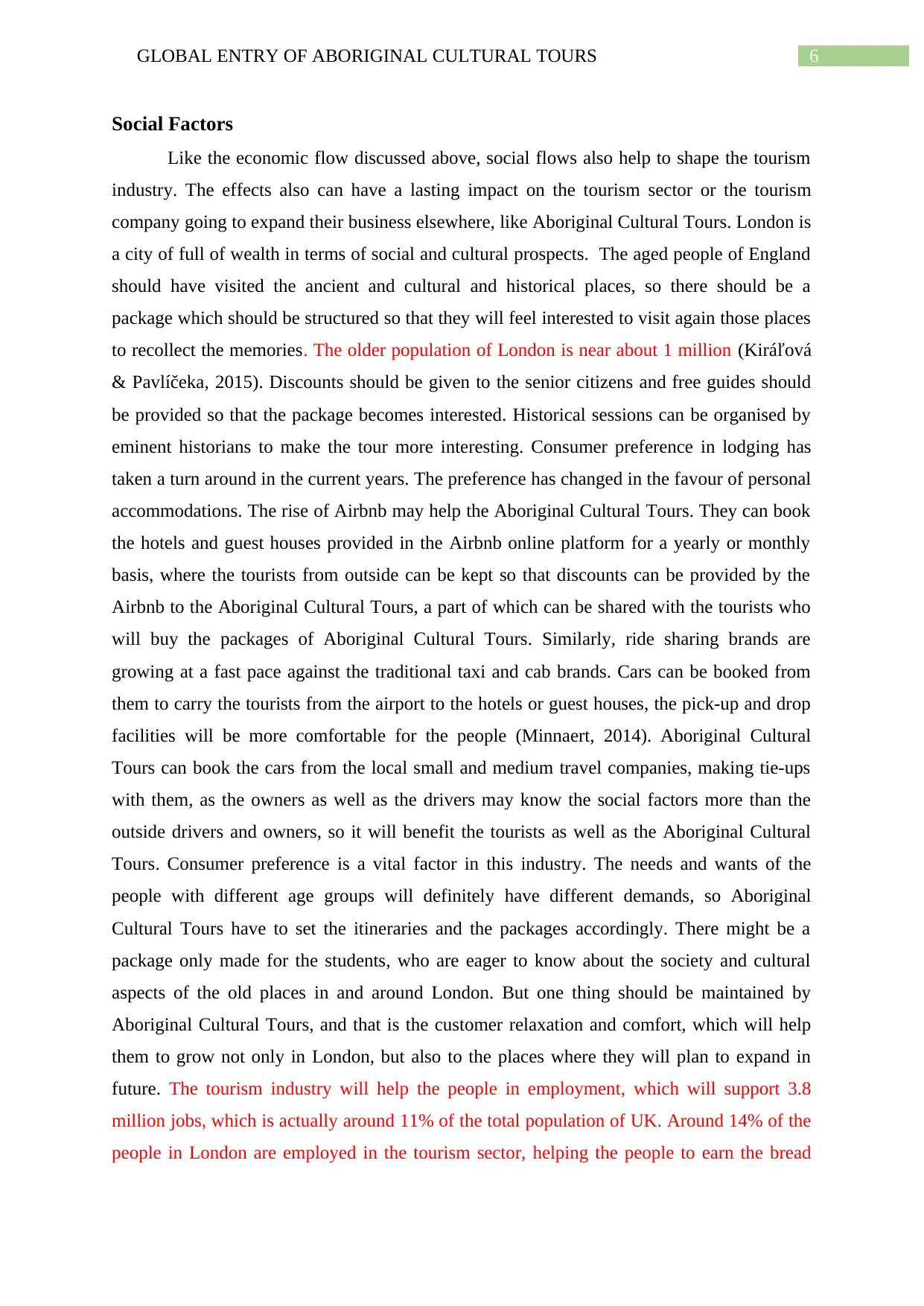
6GLOBAL ENTRY OF ABORIGINAL CULTURAL TOURS
Social Factors
Like the economic flow discussed above, social flows also help to shape the tourism
industry. The effects also can have a lasting impact on the tourism sector or the tourism
company going to expand their business elsewhere, like Aboriginal Cultural Tours. London is
a city of full of wealth in terms of social and cultural prospects. The aged people of England
should have visited the ancient and cultural and historical places, so there should be a
package which should be structured so that they will feel interested to visit again those places
to recollect the memories. The older population of London is near about 1 million (Kiráľová
& Pavlíčeka, 2015). Discounts should be given to the senior citizens and free guides should
be provided so that the package becomes interested. Historical sessions can be organised by
eminent historians to make the tour more interesting. Consumer preference in lodging has
taken a turn around in the current years. The preference has changed in the favour of personal
accommodations. The rise of Airbnb may help the Aboriginal Cultural Tours. They can book
the hotels and guest houses provided in the Airbnb online platform for a yearly or monthly
basis, where the tourists from outside can be kept so that discounts can be provided by the
Airbnb to the Aboriginal Cultural Tours, a part of which can be shared with the tourists who
will buy the packages of Aboriginal Cultural Tours. Similarly, ride sharing brands are
growing at a fast pace against the traditional taxi and cab brands. Cars can be booked from
them to carry the tourists from the airport to the hotels or guest houses, the pick-up and drop
facilities will be more comfortable for the people (Minnaert, 2014). Aboriginal Cultural
Tours can book the cars from the local small and medium travel companies, making tie-ups
with them, as the owners as well as the drivers may know the social factors more than the
outside drivers and owners, so it will benefit the tourists as well as the Aboriginal Cultural
Tours. Consumer preference is a vital factor in this industry. The needs and wants of the
people with different age groups will definitely have different demands, so Aboriginal
Cultural Tours have to set the itineraries and the packages accordingly. There might be a
package only made for the students, who are eager to know about the society and cultural
aspects of the old places in and around London. But one thing should be maintained by
Aboriginal Cultural Tours, and that is the customer relaxation and comfort, which will help
them to grow not only in London, but also to the places where they will plan to expand in
future. The tourism industry will help the people in employment, which will support 3.8
million jobs, which is actually around 11% of the total population of UK. Around 14% of the
people in London are employed in the tourism sector, helping the people to earn the bread
Social Factors
Like the economic flow discussed above, social flows also help to shape the tourism
industry. The effects also can have a lasting impact on the tourism sector or the tourism
company going to expand their business elsewhere, like Aboriginal Cultural Tours. London is
a city of full of wealth in terms of social and cultural prospects. The aged people of England
should have visited the ancient and cultural and historical places, so there should be a
package which should be structured so that they will feel interested to visit again those places
to recollect the memories. The older population of London is near about 1 million (Kiráľová
& Pavlíčeka, 2015). Discounts should be given to the senior citizens and free guides should
be provided so that the package becomes interested. Historical sessions can be organised by
eminent historians to make the tour more interesting. Consumer preference in lodging has
taken a turn around in the current years. The preference has changed in the favour of personal
accommodations. The rise of Airbnb may help the Aboriginal Cultural Tours. They can book
the hotels and guest houses provided in the Airbnb online platform for a yearly or monthly
basis, where the tourists from outside can be kept so that discounts can be provided by the
Airbnb to the Aboriginal Cultural Tours, a part of which can be shared with the tourists who
will buy the packages of Aboriginal Cultural Tours. Similarly, ride sharing brands are
growing at a fast pace against the traditional taxi and cab brands. Cars can be booked from
them to carry the tourists from the airport to the hotels or guest houses, the pick-up and drop
facilities will be more comfortable for the people (Minnaert, 2014). Aboriginal Cultural
Tours can book the cars from the local small and medium travel companies, making tie-ups
with them, as the owners as well as the drivers may know the social factors more than the
outside drivers and owners, so it will benefit the tourists as well as the Aboriginal Cultural
Tours. Consumer preference is a vital factor in this industry. The needs and wants of the
people with different age groups will definitely have different demands, so Aboriginal
Cultural Tours have to set the itineraries and the packages accordingly. There might be a
package only made for the students, who are eager to know about the society and cultural
aspects of the old places in and around London. But one thing should be maintained by
Aboriginal Cultural Tours, and that is the customer relaxation and comfort, which will help
them to grow not only in London, but also to the places where they will plan to expand in
future. The tourism industry will help the people in employment, which will support 3.8
million jobs, which is actually around 11% of the total population of UK. Around 14% of the
people in London are employed in the tourism sector, helping the people to earn the bread
Paraphrase This Document
Need a fresh take? Get an instant paraphrase of this document with our AI Paraphraser
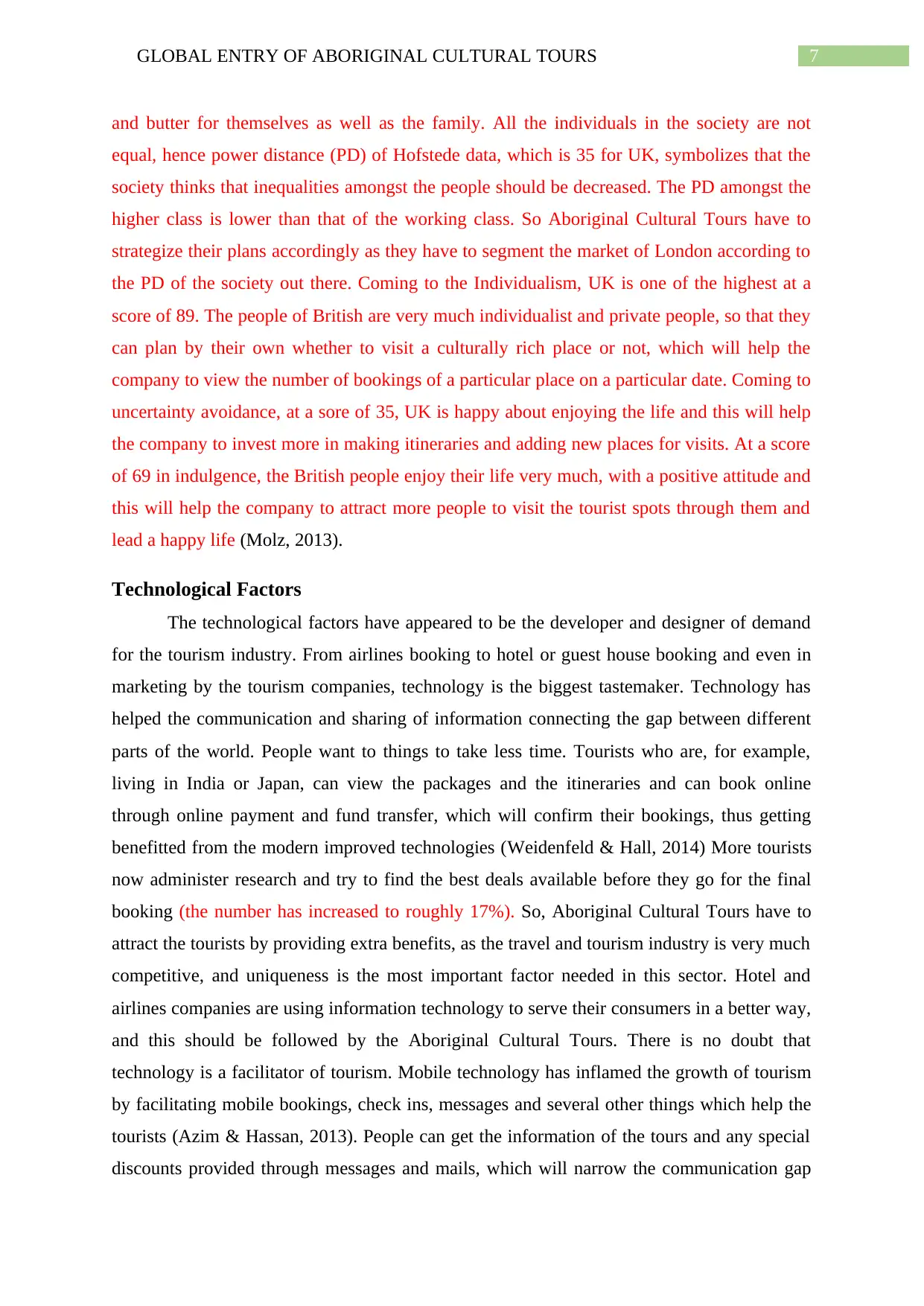
7GLOBAL ENTRY OF ABORIGINAL CULTURAL TOURS
and butter for themselves as well as the family. All the individuals in the society are not
equal, hence power distance (PD) of Hofstede data, which is 35 for UK, symbolizes that the
society thinks that inequalities amongst the people should be decreased. The PD amongst the
higher class is lower than that of the working class. So Aboriginal Cultural Tours have to
strategize their plans accordingly as they have to segment the market of London according to
the PD of the society out there. Coming to the Individualism, UK is one of the highest at a
score of 89. The people of British are very much individualist and private people, so that they
can plan by their own whether to visit a culturally rich place or not, which will help the
company to view the number of bookings of a particular place on a particular date. Coming to
uncertainty avoidance, at a sore of 35, UK is happy about enjoying the life and this will help
the company to invest more in making itineraries and adding new places for visits. At a score
of 69 in indulgence, the British people enjoy their life very much, with a positive attitude and
this will help the company to attract more people to visit the tourist spots through them and
lead a happy life (Molz, 2013).
Technological Factors
The technological factors have appeared to be the developer and designer of demand
for the tourism industry. From airlines booking to hotel or guest house booking and even in
marketing by the tourism companies, technology is the biggest tastemaker. Technology has
helped the communication and sharing of information connecting the gap between different
parts of the world. People want to things to take less time. Tourists who are, for example,
living in India or Japan, can view the packages and the itineraries and can book online
through online payment and fund transfer, which will confirm their bookings, thus getting
benefitted from the modern improved technologies (Weidenfeld & Hall, 2014) More tourists
now administer research and try to find the best deals available before they go for the final
booking (the number has increased to roughly 17%). So, Aboriginal Cultural Tours have to
attract the tourists by providing extra benefits, as the travel and tourism industry is very much
competitive, and uniqueness is the most important factor needed in this sector. Hotel and
airlines companies are using information technology to serve their consumers in a better way,
and this should be followed by the Aboriginal Cultural Tours. There is no doubt that
technology is a facilitator of tourism. Mobile technology has inflamed the growth of tourism
by facilitating mobile bookings, check ins, messages and several other things which help the
tourists (Azim & Hassan, 2013). People can get the information of the tours and any special
discounts provided through messages and mails, which will narrow the communication gap
and butter for themselves as well as the family. All the individuals in the society are not
equal, hence power distance (PD) of Hofstede data, which is 35 for UK, symbolizes that the
society thinks that inequalities amongst the people should be decreased. The PD amongst the
higher class is lower than that of the working class. So Aboriginal Cultural Tours have to
strategize their plans accordingly as they have to segment the market of London according to
the PD of the society out there. Coming to the Individualism, UK is one of the highest at a
score of 89. The people of British are very much individualist and private people, so that they
can plan by their own whether to visit a culturally rich place or not, which will help the
company to view the number of bookings of a particular place on a particular date. Coming to
uncertainty avoidance, at a sore of 35, UK is happy about enjoying the life and this will help
the company to invest more in making itineraries and adding new places for visits. At a score
of 69 in indulgence, the British people enjoy their life very much, with a positive attitude and
this will help the company to attract more people to visit the tourist spots through them and
lead a happy life (Molz, 2013).
Technological Factors
The technological factors have appeared to be the developer and designer of demand
for the tourism industry. From airlines booking to hotel or guest house booking and even in
marketing by the tourism companies, technology is the biggest tastemaker. Technology has
helped the communication and sharing of information connecting the gap between different
parts of the world. People want to things to take less time. Tourists who are, for example,
living in India or Japan, can view the packages and the itineraries and can book online
through online payment and fund transfer, which will confirm their bookings, thus getting
benefitted from the modern improved technologies (Weidenfeld & Hall, 2014) More tourists
now administer research and try to find the best deals available before they go for the final
booking (the number has increased to roughly 17%). So, Aboriginal Cultural Tours have to
attract the tourists by providing extra benefits, as the travel and tourism industry is very much
competitive, and uniqueness is the most important factor needed in this sector. Hotel and
airlines companies are using information technology to serve their consumers in a better way,
and this should be followed by the Aboriginal Cultural Tours. There is no doubt that
technology is a facilitator of tourism. Mobile technology has inflamed the growth of tourism
by facilitating mobile bookings, check ins, messages and several other things which help the
tourists (Azim & Hassan, 2013). People can get the information of the tours and any special
discounts provided through messages and mails, which will narrow the communication gap
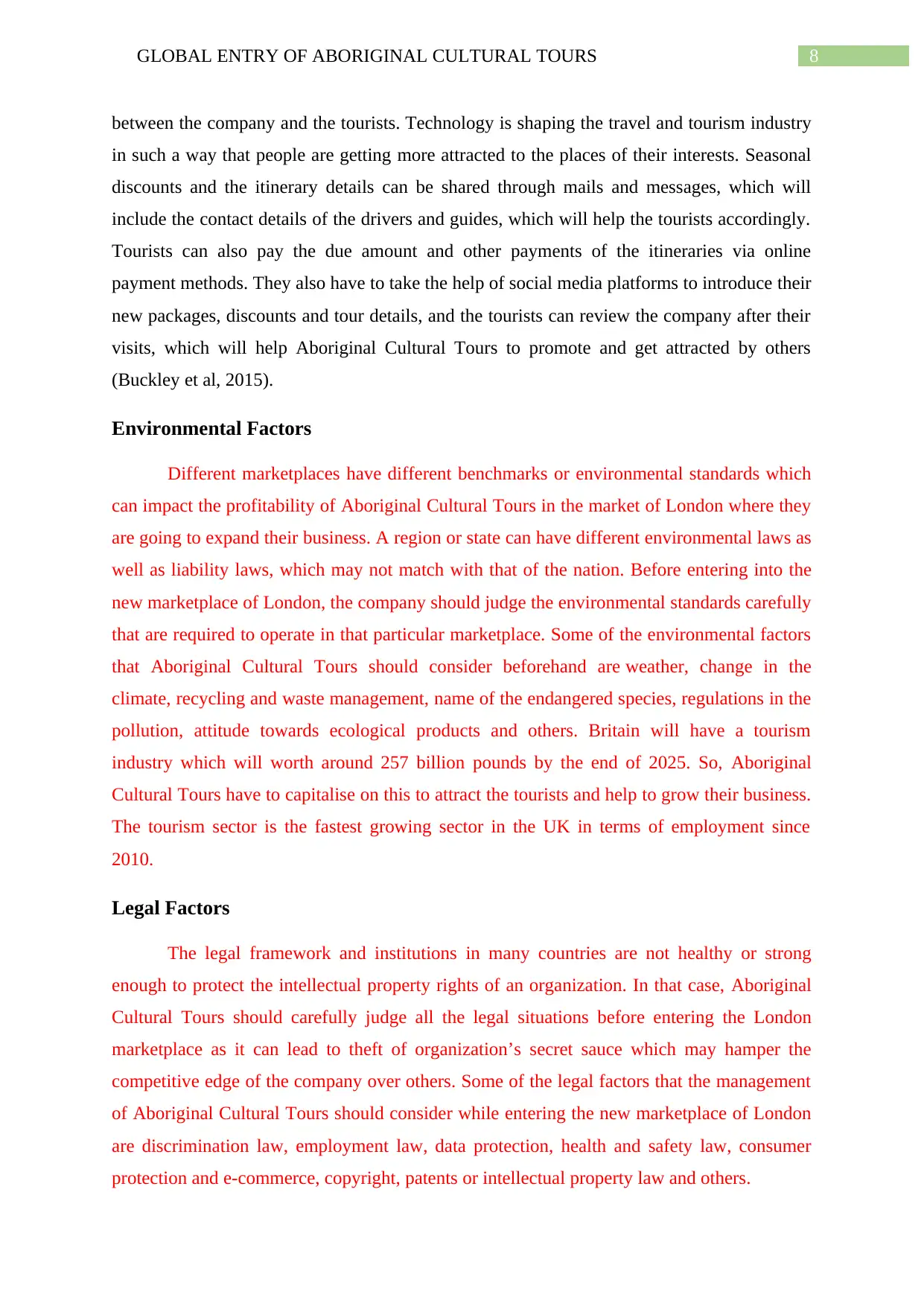
8GLOBAL ENTRY OF ABORIGINAL CULTURAL TOURS
between the company and the tourists. Technology is shaping the travel and tourism industry
in such a way that people are getting more attracted to the places of their interests. Seasonal
discounts and the itinerary details can be shared through mails and messages, which will
include the contact details of the drivers and guides, which will help the tourists accordingly.
Tourists can also pay the due amount and other payments of the itineraries via online
payment methods. They also have to take the help of social media platforms to introduce their
new packages, discounts and tour details, and the tourists can review the company after their
visits, which will help Aboriginal Cultural Tours to promote and get attracted by others
(Buckley et al, 2015).
Environmental Factors
Different marketplaces have different benchmarks or environmental standards which
can impact the profitability of Aboriginal Cultural Tours in the market of London where they
are going to expand their business. A region or state can have different environmental laws as
well as liability laws, which may not match with that of the nation. Before entering into the
new marketplace of London, the company should judge the environmental standards carefully
that are required to operate in that particular marketplace. Some of the environmental factors
that Aboriginal Cultural Tours should consider beforehand are weather, change in the
climate, recycling and waste management, name of the endangered species, regulations in the
pollution, attitude towards ecological products and others. Britain will have a tourism
industry which will worth around 257 billion pounds by the end of 2025. So, Aboriginal
Cultural Tours have to capitalise on this to attract the tourists and help to grow their business.
The tourism sector is the fastest growing sector in the UK in terms of employment since
2010.
Legal Factors
The legal framework and institutions in many countries are not healthy or strong
enough to protect the intellectual property rights of an organization. In that case, Aboriginal
Cultural Tours should carefully judge all the legal situations before entering the London
marketplace as it can lead to theft of organization’s secret sauce which may hamper the
competitive edge of the company over others. Some of the legal factors that the management
of Aboriginal Cultural Tours should consider while entering the new marketplace of London
are discrimination law, employment law, data protection, health and safety law, consumer
protection and e-commerce, copyright, patents or intellectual property law and others.
between the company and the tourists. Technology is shaping the travel and tourism industry
in such a way that people are getting more attracted to the places of their interests. Seasonal
discounts and the itinerary details can be shared through mails and messages, which will
include the contact details of the drivers and guides, which will help the tourists accordingly.
Tourists can also pay the due amount and other payments of the itineraries via online
payment methods. They also have to take the help of social media platforms to introduce their
new packages, discounts and tour details, and the tourists can review the company after their
visits, which will help Aboriginal Cultural Tours to promote and get attracted by others
(Buckley et al, 2015).
Environmental Factors
Different marketplaces have different benchmarks or environmental standards which
can impact the profitability of Aboriginal Cultural Tours in the market of London where they
are going to expand their business. A region or state can have different environmental laws as
well as liability laws, which may not match with that of the nation. Before entering into the
new marketplace of London, the company should judge the environmental standards carefully
that are required to operate in that particular marketplace. Some of the environmental factors
that Aboriginal Cultural Tours should consider beforehand are weather, change in the
climate, recycling and waste management, name of the endangered species, regulations in the
pollution, attitude towards ecological products and others. Britain will have a tourism
industry which will worth around 257 billion pounds by the end of 2025. So, Aboriginal
Cultural Tours have to capitalise on this to attract the tourists and help to grow their business.
The tourism sector is the fastest growing sector in the UK in terms of employment since
2010.
Legal Factors
The legal framework and institutions in many countries are not healthy or strong
enough to protect the intellectual property rights of an organization. In that case, Aboriginal
Cultural Tours should carefully judge all the legal situations before entering the London
marketplace as it can lead to theft of organization’s secret sauce which may hamper the
competitive edge of the company over others. Some of the legal factors that the management
of Aboriginal Cultural Tours should consider while entering the new marketplace of London
are discrimination law, employment law, data protection, health and safety law, consumer
protection and e-commerce, copyright, patents or intellectual property law and others.
⊘ This is a preview!⊘
Do you want full access?
Subscribe today to unlock all pages.

Trusted by 1+ million students worldwide
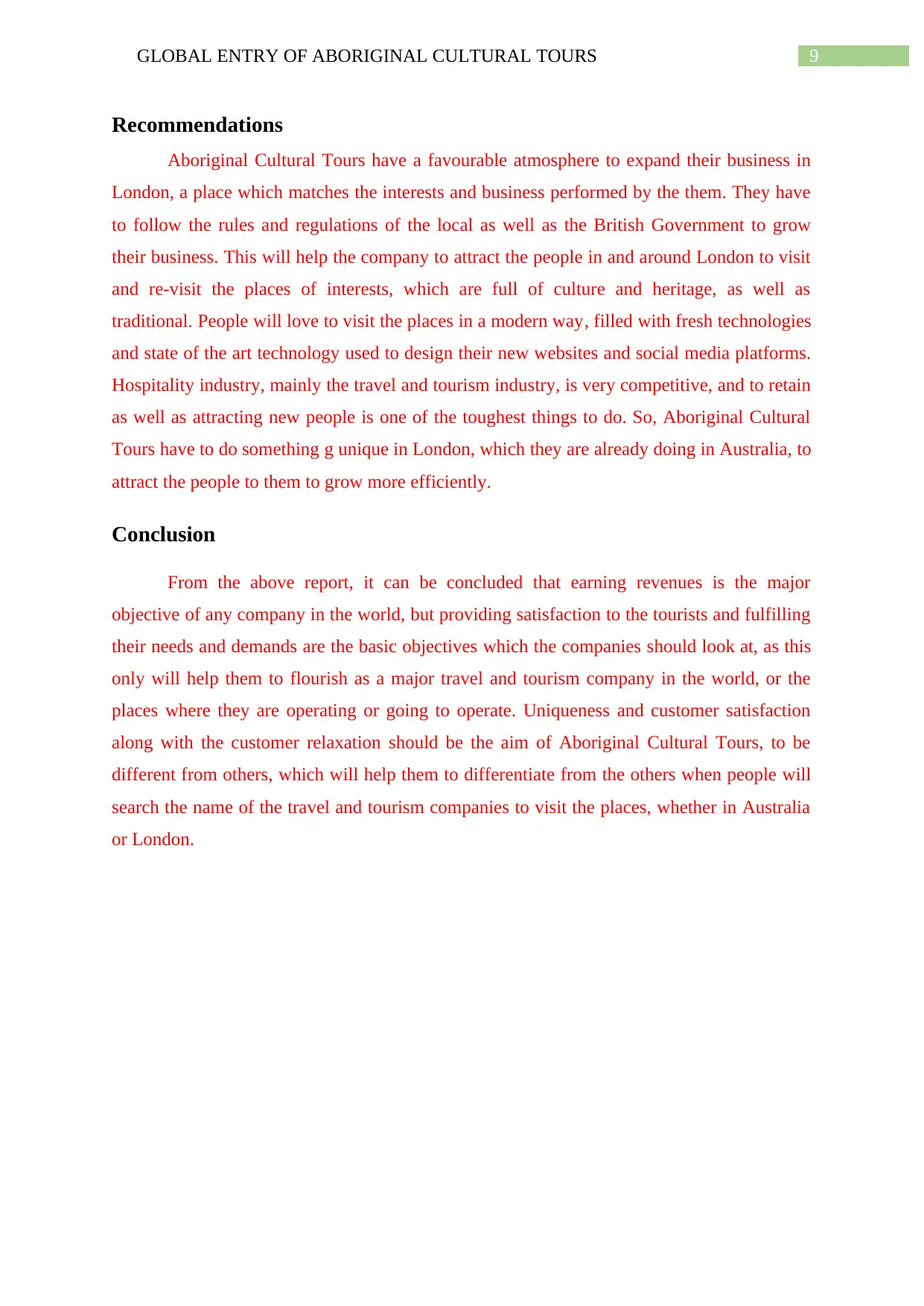
9GLOBAL ENTRY OF ABORIGINAL CULTURAL TOURS
Recommendations
Aboriginal Cultural Tours have a favourable atmosphere to expand their business in
London, a place which matches the interests and business performed by the them. They have
to follow the rules and regulations of the local as well as the British Government to grow
their business. This will help the company to attract the people in and around London to visit
and re-visit the places of interests, which are full of culture and heritage, as well as
traditional. People will love to visit the places in a modern way, filled with fresh technologies
and state of the art technology used to design their new websites and social media platforms.
Hospitality industry, mainly the travel and tourism industry, is very competitive, and to retain
as well as attracting new people is one of the toughest things to do. So, Aboriginal Cultural
Tours have to do something g unique in London, which they are already doing in Australia, to
attract the people to them to grow more efficiently.
Conclusion
From the above report, it can be concluded that earning revenues is the major
objective of any company in the world, but providing satisfaction to the tourists and fulfilling
their needs and demands are the basic objectives which the companies should look at, as this
only will help them to flourish as a major travel and tourism company in the world, or the
places where they are operating or going to operate. Uniqueness and customer satisfaction
along with the customer relaxation should be the aim of Aboriginal Cultural Tours, to be
different from others, which will help them to differentiate from the others when people will
search the name of the travel and tourism companies to visit the places, whether in Australia
or London.
Recommendations
Aboriginal Cultural Tours have a favourable atmosphere to expand their business in
London, a place which matches the interests and business performed by the them. They have
to follow the rules and regulations of the local as well as the British Government to grow
their business. This will help the company to attract the people in and around London to visit
and re-visit the places of interests, which are full of culture and heritage, as well as
traditional. People will love to visit the places in a modern way, filled with fresh technologies
and state of the art technology used to design their new websites and social media platforms.
Hospitality industry, mainly the travel and tourism industry, is very competitive, and to retain
as well as attracting new people is one of the toughest things to do. So, Aboriginal Cultural
Tours have to do something g unique in London, which they are already doing in Australia, to
attract the people to them to grow more efficiently.
Conclusion
From the above report, it can be concluded that earning revenues is the major
objective of any company in the world, but providing satisfaction to the tourists and fulfilling
their needs and demands are the basic objectives which the companies should look at, as this
only will help them to flourish as a major travel and tourism company in the world, or the
places where they are operating or going to operate. Uniqueness and customer satisfaction
along with the customer relaxation should be the aim of Aboriginal Cultural Tours, to be
different from others, which will help them to differentiate from the others when people will
search the name of the travel and tourism companies to visit the places, whether in Australia
or London.
Paraphrase This Document
Need a fresh take? Get an instant paraphrase of this document with our AI Paraphraser
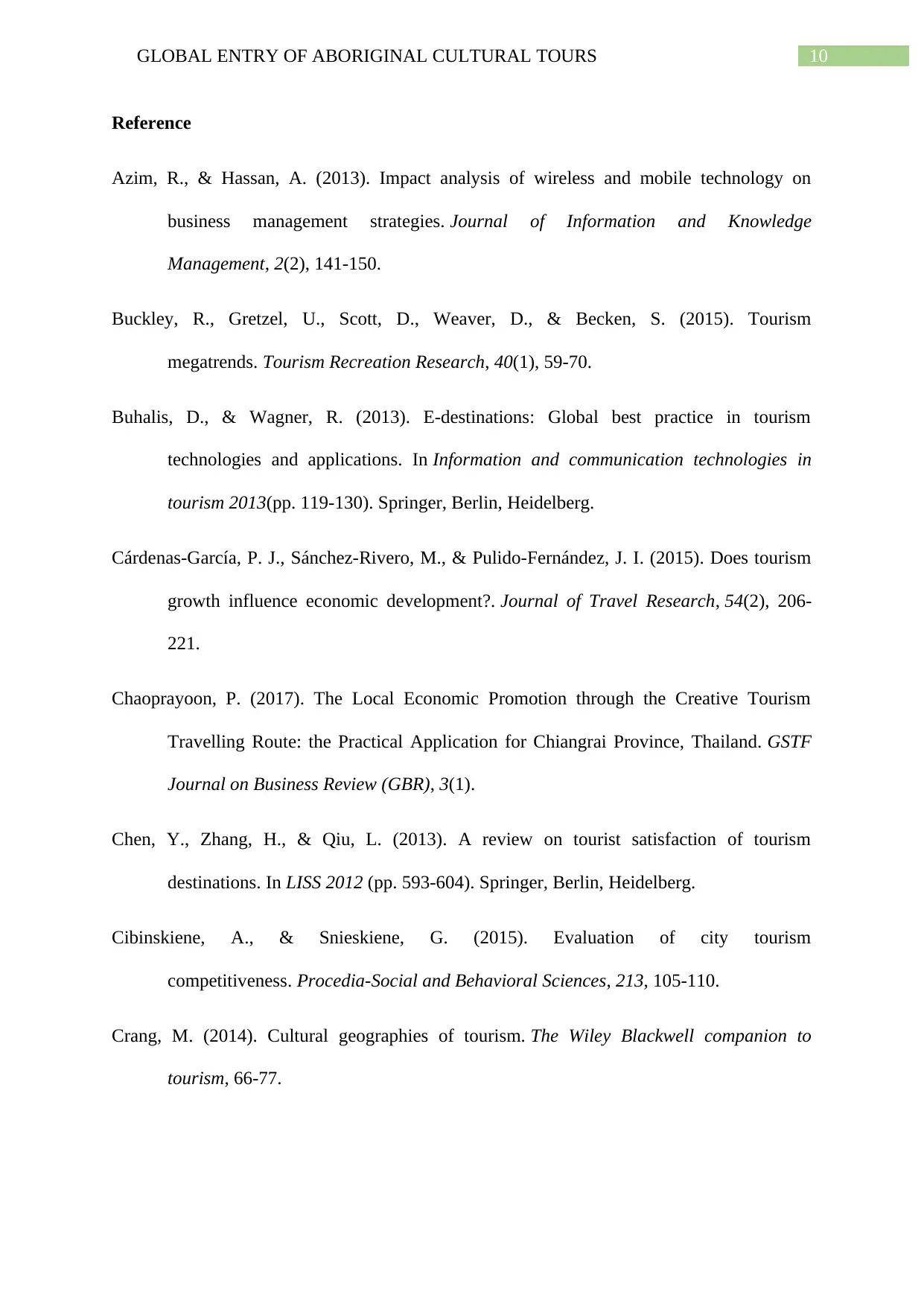
10GLOBAL ENTRY OF ABORIGINAL CULTURAL TOURS
Reference
Azim, R., & Hassan, A. (2013). Impact analysis of wireless and mobile technology on
business management strategies. Journal of Information and Knowledge
Management, 2(2), 141-150.
Buckley, R., Gretzel, U., Scott, D., Weaver, D., & Becken, S. (2015). Tourism
megatrends. Tourism Recreation Research, 40(1), 59-70.
Buhalis, D., & Wagner, R. (2013). E-destinations: Global best practice in tourism
technologies and applications. In Information and communication technologies in
tourism 2013(pp. 119-130). Springer, Berlin, Heidelberg.
Cárdenas-García, P. J., Sánchez-Rivero, M., & Pulido-Fernández, J. I. (2015). Does tourism
growth influence economic development?. Journal of Travel Research, 54(2), 206-
221.
Chaoprayoon, P. (2017). The Local Economic Promotion through the Creative Tourism
Travelling Route: the Practical Application for Chiangrai Province, Thailand. GSTF
Journal on Business Review (GBR), 3(1).
Chen, Y., Zhang, H., & Qiu, L. (2013). A review on tourist satisfaction of tourism
destinations. In LISS 2012 (pp. 593-604). Springer, Berlin, Heidelberg.
Cibinskiene, A., & Snieskiene, G. (2015). Evaluation of city tourism
competitiveness. Procedia-Social and Behavioral Sciences, 213, 105-110.
Crang, M. (2014). Cultural geographies of tourism. The Wiley Blackwell companion to
tourism, 66-77.
Reference
Azim, R., & Hassan, A. (2013). Impact analysis of wireless and mobile technology on
business management strategies. Journal of Information and Knowledge
Management, 2(2), 141-150.
Buckley, R., Gretzel, U., Scott, D., Weaver, D., & Becken, S. (2015). Tourism
megatrends. Tourism Recreation Research, 40(1), 59-70.
Buhalis, D., & Wagner, R. (2013). E-destinations: Global best practice in tourism
technologies and applications. In Information and communication technologies in
tourism 2013(pp. 119-130). Springer, Berlin, Heidelberg.
Cárdenas-García, P. J., Sánchez-Rivero, M., & Pulido-Fernández, J. I. (2015). Does tourism
growth influence economic development?. Journal of Travel Research, 54(2), 206-
221.
Chaoprayoon, P. (2017). The Local Economic Promotion through the Creative Tourism
Travelling Route: the Practical Application for Chiangrai Province, Thailand. GSTF
Journal on Business Review (GBR), 3(1).
Chen, Y., Zhang, H., & Qiu, L. (2013). A review on tourist satisfaction of tourism
destinations. In LISS 2012 (pp. 593-604). Springer, Berlin, Heidelberg.
Cibinskiene, A., & Snieskiene, G. (2015). Evaluation of city tourism
competitiveness. Procedia-Social and Behavioral Sciences, 213, 105-110.
Crang, M. (2014). Cultural geographies of tourism. The Wiley Blackwell companion to
tourism, 66-77.
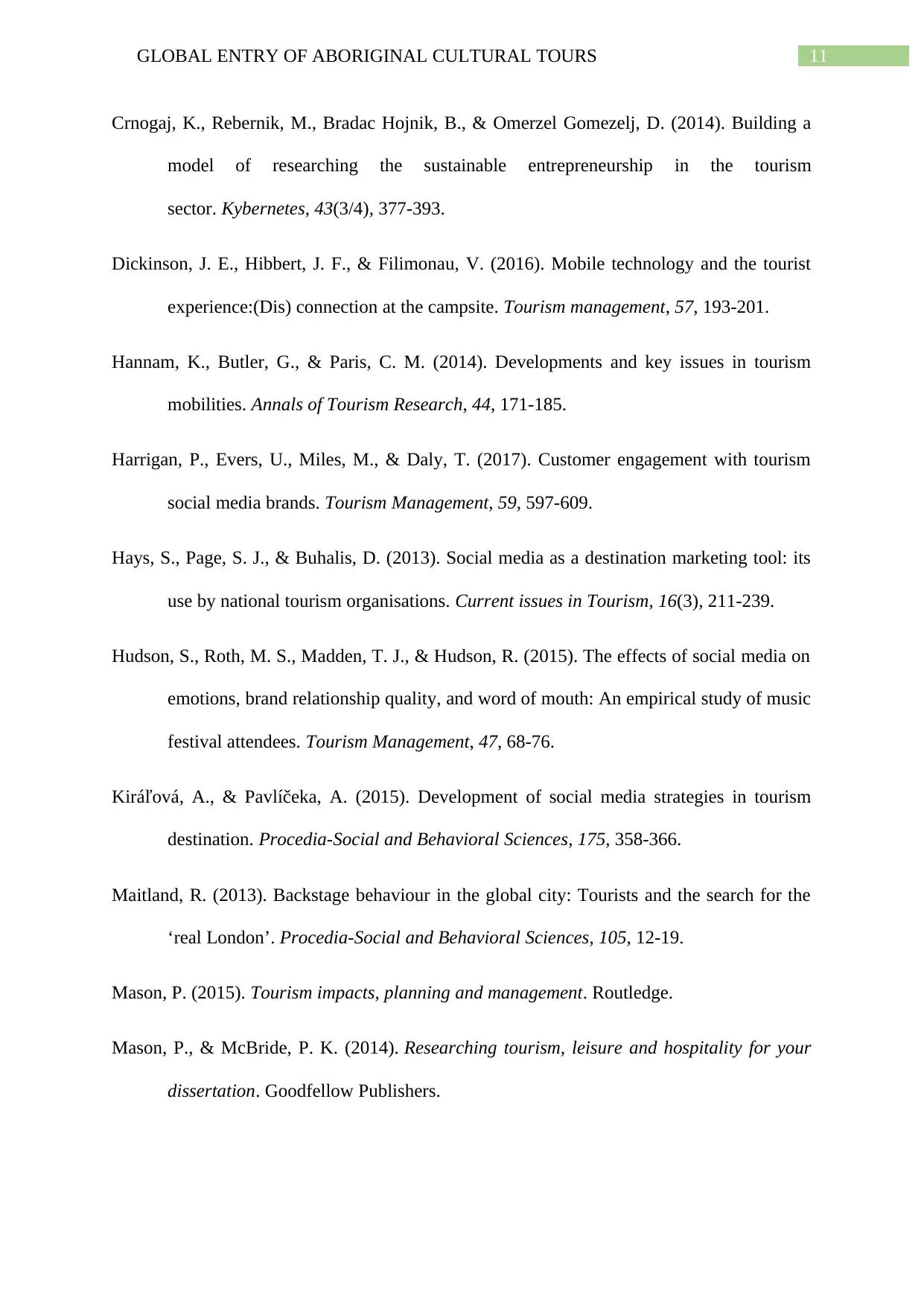
11GLOBAL ENTRY OF ABORIGINAL CULTURAL TOURS
Crnogaj, K., Rebernik, M., Bradac Hojnik, B., & Omerzel Gomezelj, D. (2014). Building a
model of researching the sustainable entrepreneurship in the tourism
sector. Kybernetes, 43(3/4), 377-393.
Dickinson, J. E., Hibbert, J. F., & Filimonau, V. (2016). Mobile technology and the tourist
experience:(Dis) connection at the campsite. Tourism management, 57, 193-201.
Hannam, K., Butler, G., & Paris, C. M. (2014). Developments and key issues in tourism
mobilities. Annals of Tourism Research, 44, 171-185.
Harrigan, P., Evers, U., Miles, M., & Daly, T. (2017). Customer engagement with tourism
social media brands. Tourism Management, 59, 597-609.
Hays, S., Page, S. J., & Buhalis, D. (2013). Social media as a destination marketing tool: its
use by national tourism organisations. Current issues in Tourism, 16(3), 211-239.
Hudson, S., Roth, M. S., Madden, T. J., & Hudson, R. (2015). The effects of social media on
emotions, brand relationship quality, and word of mouth: An empirical study of music
festival attendees. Tourism Management, 47, 68-76.
Kiráľová, A., & Pavlíčeka, A. (2015). Development of social media strategies in tourism
destination. Procedia-Social and Behavioral Sciences, 175, 358-366.
Maitland, R. (2013). Backstage behaviour in the global city: Tourists and the search for the
‘real London’. Procedia-Social and Behavioral Sciences, 105, 12-19.
Mason, P. (2015). Tourism impacts, planning and management. Routledge.
Mason, P., & McBride, P. K. (2014). Researching tourism, leisure and hospitality for your
dissertation. Goodfellow Publishers.
Crnogaj, K., Rebernik, M., Bradac Hojnik, B., & Omerzel Gomezelj, D. (2014). Building a
model of researching the sustainable entrepreneurship in the tourism
sector. Kybernetes, 43(3/4), 377-393.
Dickinson, J. E., Hibbert, J. F., & Filimonau, V. (2016). Mobile technology and the tourist
experience:(Dis) connection at the campsite. Tourism management, 57, 193-201.
Hannam, K., Butler, G., & Paris, C. M. (2014). Developments and key issues in tourism
mobilities. Annals of Tourism Research, 44, 171-185.
Harrigan, P., Evers, U., Miles, M., & Daly, T. (2017). Customer engagement with tourism
social media brands. Tourism Management, 59, 597-609.
Hays, S., Page, S. J., & Buhalis, D. (2013). Social media as a destination marketing tool: its
use by national tourism organisations. Current issues in Tourism, 16(3), 211-239.
Hudson, S., Roth, M. S., Madden, T. J., & Hudson, R. (2015). The effects of social media on
emotions, brand relationship quality, and word of mouth: An empirical study of music
festival attendees. Tourism Management, 47, 68-76.
Kiráľová, A., & Pavlíčeka, A. (2015). Development of social media strategies in tourism
destination. Procedia-Social and Behavioral Sciences, 175, 358-366.
Maitland, R. (2013). Backstage behaviour in the global city: Tourists and the search for the
‘real London’. Procedia-Social and Behavioral Sciences, 105, 12-19.
Mason, P. (2015). Tourism impacts, planning and management. Routledge.
Mason, P., & McBride, P. K. (2014). Researching tourism, leisure and hospitality for your
dissertation. Goodfellow Publishers.
⊘ This is a preview!⊘
Do you want full access?
Subscribe today to unlock all pages.

Trusted by 1+ million students worldwide
1 out of 13
Related Documents
Your All-in-One AI-Powered Toolkit for Academic Success.
+13062052269
info@desklib.com
Available 24*7 on WhatsApp / Email
![[object Object]](/_next/static/media/star-bottom.7253800d.svg)
Unlock your academic potential
Copyright © 2020–2026 A2Z Services. All Rights Reserved. Developed and managed by ZUCOL.




